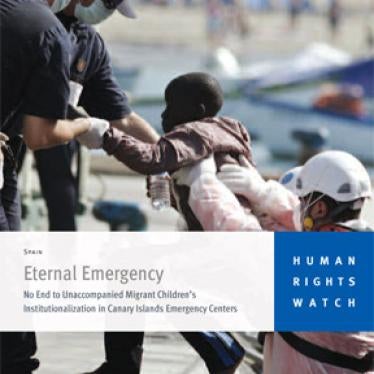(Geneva) - The Canary Islands government's decision to keep more than 250 unaccompanied migrant children in unregulated emergency shelters puts the children at risk and threatens their well-being, Human Rights Watch said in a report released today.
The 40-page report, "Eternal Emergency: No End to Unaccompanied Migrant Children's Institutionalization in Canary Islands Emergency Centers," says that the centers fail to comply with the Canary Islands government's minimum care standards for migrant children and have no occupancy limits. The approximately 100 children in the biggest and most secluded emergency center, La Esperanza, receive low-quality food, lack adequate heating, hot water, and blankets, and report frequent violence from other children.
In the wake of this report's publication, the Canary Islands government informed Human Rights Watch orally on June 15 that it plans to close down La Esperanza emergency center by December 2010 and move children to other centers, including the emergency centers at Tegueste and Arinaga. It has not committed itself to make those centers subject to its own established minimum standards of care.
"We welcome that the Canary Islands government intends to close the worst of these facilities, where children are at risk," said Simone Troller, children's rights researcher at Human Rights Watch. "We look forward to seeing that intent translated into a firm plan and concrete measures to ensure the center is actually closed. At the same time, it should end the emergency regime as a whole and bring all centers for unaccompanied minors in line with mainstream standards of care."
The emergency centers were established in 2006 as a temporary measure in response to the arrival of an unprecedented number of unaccompanied migrant children on the Islands.
Human Rights Watch's new findings come three years after it first documented serious allegations of ill-treatment of children in the centers by staff, overcrowded and substandard infrastructure, violence by older children against younger ones, and lack of oversight by bodies in charge. The initial findings were published in a June 2007 report, "Unwelcome Responsibilities: Spain's Failure to Protect the Rights of Unaccompanied Migrant Children in the Canary Islands."
Some conditions have improved since 2007, Human Rights Watch said. Children have access to education and training opportunities outside their residences, and monitoring visits by institutions charged to oversee conditions appear to be more frequent. Human Rights Watch found that conditions at Arinaga center in particular had improved, in large part because fewer children are housed there. Human Rights Watch is concerned that in the absence of careful planning and enforceable standards of care, the transfer of significant numbers of children from La Esperanza to Arinaga may jeopardize the progress made.
Other serious concerns also persist in emergency centers, Human Rights Watch said. These include the absence of a functioning mechanism to file confidential complaints, mixing of younger children with older peers in one emergency center, insufficient access to the system for seeking asylum, the absence of occupancy limits, and the limited opportunities to become integrated in the community. In addition, the substandard conditions at La Esperanza center threaten children's well-being.
A 16-year-old boy described conditions at La Esperanza: "It is very hard, especially in the winter... of course I'm cold at night. I have one blanket... there is no point to ask for another blanket. They won't give it to you. Nobody has two blankets.... Sometimes it's so cold you can't sleep."
Human Rights Watch called on the Canary Islands government to close La Esperanza as a matter of priority and to bring all remaining structures into conformity with Canary Islands minimum standards and occupancy limits for centers accommodating unaccompanied migrant children.
At the time the emergency centers were established in 2006, large numbers of migrants without proper documents arrived from West Africa, including 1,000 unaccompanied children that year. The stream of arrivals has slowed down since then.
The Canary Islands had faced arrivals of unaccompanied migrant children prior to 2006, and had a functioning network of smaller, regulated homes, which continue to provide care and integration opportunities for a total of 250 children at a given time. Unaccompanied migrant children exceeding that number, however, are sent to the unregulated emergency structures.
The Canary Islands government says it has tried to establish more small centers that would conform to existing minimum standards, but met resistance from local municipalities. But that does not explain why it has closed some existing smaller centers, while it kept La Esperanza up and running.
Center staff, nongovernmental organizations, and public prosecutors in the Islands interviewed by Human Rights Watch attributed the lack of progress to the government, saying it lacked the political will to grant children better care or kept emergency centers open as a means to put pressure on the central government in Madrid to increase funding or transfer children to other parts of Spain.
The central government in Madrid has stepped up its financial contributions for the Canary Islands in recent years and provided more than half of the archipelago's €26 million budget for the care of migrant children in 2009. It has also helped arrange and finance the transfer of children to other regions of Spain.
The government in Madrid should require the Canary Islands government both to provide adequate care and to develop a concrete plan for closing the centers as a condition of its financial assistance, Human Rights Watch said.
Spain's children's rights record will come under increased scrutiny this year. Spain has declared the plight of unaccompanied migrant children a priority issue during its European Union presidency, and it must report on its own children's rights record to the United Nations Committee on the Rights of the Child in fall this year.
"Spain has pushed the plight of migrant children onto the EU's policy agenda during its EU presidency," Troller said. "It should lead by example and ensure proper protection in the Canaries for these children."








